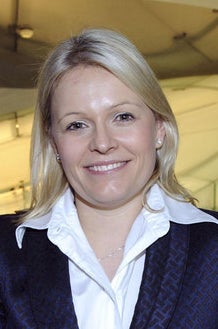A quarter of board positions at the UK's leading businesses are now held by women, but this must increase to a third by 2020, a new report has urged.

Lord Davis, the report's author and a former trade minister, told the BBC there had been a "steady and sustained increase" of women on boards of FTSE 100 companies, doubling from 12.5% in 2011 to meet a voluntary target of 25% today.
A new voluntary target of 33% female boards by 2020 has now been set. This target has been widened further to include the next tier of UK companies, known as the FTSE 350.
Davis said a quota system to ensure that more women are appointed to top board positions was not necessary as voluntary targets seemed to be working.



(From left) Olivia Garfield, the new CEO of Openreach; Alison Cooper, CEO of Imperial Tobacco Group Plc.; Martha Lane Fox, a non-executive director at Marks & Spencer and co-founder of lastminute.co.uk
Women now make up over 25% of FTSE 100 board; no single all-male FTSE 100 board left. #womenonboards #daviesreview
But while recognising the progress the report demonstrated, some equality campaigners felt that the new target was not enough, and that quotas would be an effective way of enforcing a more equal workplace.
"International evidence shows that the only really effective way to prevent male-dominated boards from recruiting in their own image is to use quotas," said Sam Smethers, chief executive of the Fawcett Society.
She said that the UK is lagging behind other countries, such as Norway, which according to The Guardian already has 35% female boards.
Smethers added: "Board diversity enhances board performance. There is an overwhelmingly strong business case now, but this still requires men with power to move over. Quotas are just a mechanism, a tool to achieve the outcome we all want to see. So let's get over it and get on with it."
The Women's Equality Party, who have been outspoken about the initial need for quotas in diversifying the workplace have said they are disappointed by what its leader Sophie Walker called "another set of underwhelming targets from Lord Davies."
She felt that the new targets fail to address a male-centric corporate culture that prevents women from becoming board members.
"Women are tired of the establishment's absurdly unambitious targets and inability to resolve this problem once and for all," Walker said. "The fact that 25% is seen as an achievement is the reason the Women's Equality Party exists."
She added that the target of 33% female board members by 2020 "isn't good enough."
Finally every FTSE 100 company has a woman in their boardroom but 260 of 286 are Non Exec positions. Now more in Execs pls #womenonboards
However, Sarah Churchman, head of diversity at accountancy firm PwC, said: "Lord Davies' recommended business-led approach has delivered results and differentiated us from those parts of Europe where quotas continue to be used to create change."
She called for the targets to be widened to include ethnic diversity, and the focus moved beyond boardrooms to the executive level of companies. "This is where women and diverse leadership teams can make a tangible difference to the culture and management of a business."
She added: "Transparent targets create accountability which in turn generate action – and action is now needed at the executive level and below ... As well as a focus on gender diversity, we would encourage the government to consider similar action to improve ethnic diversity."
